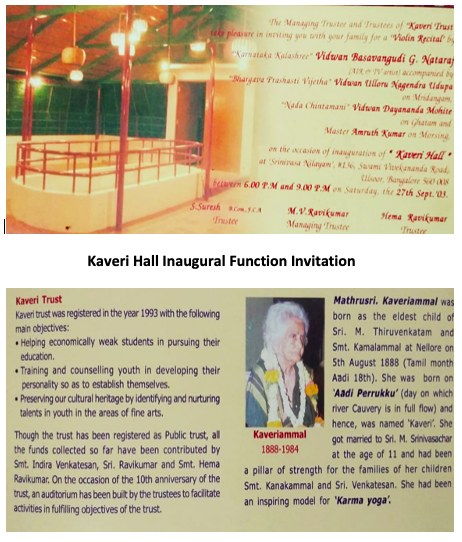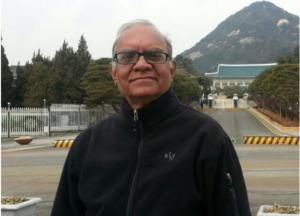KAVERI HALL
The most beautiful things are not associated with money;
they are memories and moments.
By the end of March 1993, as decided I came out of all the three enterprises that I had founded during 1981–87, apart from completing all the modifications and additions to the ancestral home by November 1992.
As India entered the era of globalisation and privatisation in 1991, it was becoming important for Small and Medium Scale industries to look at the export market. Having travelled to many countries during 1983 to 1991 on work and after completing my two-year term as President of Consortium of Electronic Industries of Karnataka (CLIK) in 1991, I mooted the idea of forming a consortium company to promote exports of products of Small and Medium Electronic industries to nearby countries to start with. A few members of CLIK welcomed this idea and by the end of 1992 eight of us came together to form CLIXPORT INDIA Private Limited – the name coined by my good friend Dwaraki whose company also was one of the founder members. Having come out of the three enterprises, I volunteered to manage the company without any compensation for a year and established the office in the first floor of my ancestral home. Meanwhile, in March 1993 I established a public trust (Kaveri Trust) with Hema and my then auditor CA Suresh as the other two trustees.
Sojan Paul was unable to manage the auto spare parts business and the business had to be wound up. Through 1994 the shop remained largely closed and naturally we didn’t receive any rent. Knowing Sojan’s limitations, I suggested to him that it would be better for him to open a small general purpose shop attached to his home at Tippasandra (four kilometres from Ulsoor), which he had bequeathed from his father. He did not have any money, so I arranged to sell some of the show-cases and storage racks apart from spending an additional Rs. 30,000 to modify the road-facing room of his house into a shop. In this manner, I got back possession of my premises.
Keshavaiah, who was our residential tenant for a short period (1969–71) was owning a stainless steel ware shop in the next building. He approached me with a request to let out the vacant shop to him for expanding his business. I told him that I would let out the place to him only if he would permit me to park my car there at night. (All these years, we had been parking our two cars on the road but in January 1995 our brand new Maruthi 800 was stolen). He agreed to my condition and Raghavendra Metal Mart was our new tenant from August 1995.
In 1995, my brother Raghu shifted from Nauru to Pohnpei, another small island town, which was part of the Federated States of Micronesia. After he moved to Pohnpei, he visited Bangalore for a few days and my mother accompanied him on his return to Pohnpei. When my elder sister’s daughter Suman’s marriage was fixed, Raghu brought my mother back home for the engagement function that was held in August 1997 and returned to Pohnpei.
In July 1999 we received an e-mail from one of Raghu’s friends saying that he was seriously ill and there was no proper medical facility in Pohnepi. That was the time we had just set up an internet connection and there were flurry of mails to and from Raghu’s friends. Finally they booked him on a flight leaving Pohnpei on 16th July that reached Chennai on 17th night via Manila and Singapore. He had to change the airline at Manila and so Goldy Myers, an American lady who was managing an NGO at Pohnpei accompanied him up to Manila to help him board the Singapore Airlines flight. With the help of Hema’s uncle Rangarajan who was earlier with International Civil Aviation Organisation, Bangkok, we could receive Raghu as he was wheeled out of the aircraft and get the clearances done quickly.
We drove straight to Apollo Hospital in the middle of the night. The doctors diagnosed Raghu’s illness as stage four cancer of stomach/oesophagus. The next day we flew him down to Bangalore and got him admitted to Bangalore Cancer Hospital. With four cycles of chemotherapy he survived for less than four months and breathed his last on 2nd November 1999. When he was in the hospital, I stayed with him at night. During one of our several conversations he once said, “Anna [elder brother], why don’t you think of building a hall on the second floor. This will help in having family get-togethers, which we often have, and it won’t disturb the home setting.”
It took almost four years for me to implement that. In 2000-1 I took over the mantle of president of the Rotary club in which I was a member since 1988. I had to visit Pohnpei to sort and settle my brother’s items and distribute to local NGOs. We celebrated 125th anniversary of our ancestral home in 2002 which coincided with my mother’s 75th birthday. I also registered for the doctoral program and had to transform from an entrepreneur to researcher.
 In May 2003, while talking to my friend Rtn. Srinivas, a civil contractor, I mentioned about building a hall on the second floor of our ancestral home with a tiled roof and openings on either sides. He enthusiastically agreed to do it on a cost of materials and labour charges basis. I decided to construct a room and a rest-room as part of the hall. Srinivas completed the project in about three months’ time. I decided to name the hall as Kaveri Hall after my paternal grandmother, as she was the pillar of support to both her children and all fourteen of her grand-children throughout her life. Ten years earlier I we had established Kaveri Trust to help economically underprivileged girls for their education. I decided to celebrate the tenth anniversary of the trust by inaugurating Kaveri Hall.
In May 2003, while talking to my friend Rtn. Srinivas, a civil contractor, I mentioned about building a hall on the second floor of our ancestral home with a tiled roof and openings on either sides. He enthusiastically agreed to do it on a cost of materials and labour charges basis. I decided to construct a room and a rest-room as part of the hall. Srinivas completed the project in about three months’ time. I decided to name the hall as Kaveri Hall after my paternal grandmother, as she was the pillar of support to both her children and all fourteen of her grand-children throughout her life. Ten years earlier I we had established Kaveri Trust to help economically underprivileged girls for their education. I decided to celebrate the tenth anniversary of the trust by inaugurating Kaveri Hall.
My son Hari had started learning the violin when he was in high school but discontinued during his board exams. Through one of her contacts Hema connected him with Vidwan Basavangudi G Nataraj. Along with his engineering course at BMS College of Engineering, Hari started attending violin classes. When we were set to inaugurate Kaveri Hall my mother learnt that I was planning to have a get-together. She suggested to me, “Why not we have a Carnatic music concert by Hari’s guru Vidwan Basavangudi Nataraj for the inauguration!” When I spoke to Sri. Nataraj, he was delighted and readily agreed. He assured me that he would arrange the percussionists and other logistics.
Kaveri Hall was inaugurated on 27th September 2003. I told my nephews, nieces, and children to manage the programme. We honoured Rtn. Srinivas, Vidwan Nataraj, and the percussionists.
With the death of my only brother, I decided to hand over management of Clixport India Private Limited to another director with the closure of Financial Year 2000–1 after complying with all the requirements of government. I registered for the doctoral program primarily to fulfil the wishes of my departed brother who died in the midst of his doctoral work (which he had been pursuing in Nova Southeastern University at Fort Lauderdale, Florida, USA). Around this time, having been nominated as Chairman for Rotary District Avoidable Blindness Committee, I decided to divide my time between research and social work.
I realised the fact that it was also time for me to consolidate my finances and initiate the process of developing a plan to handover the assets to the next generation.
June 15, 2021 | Ravi 46

